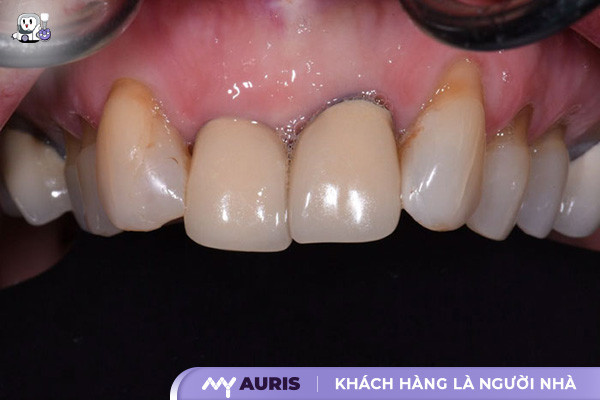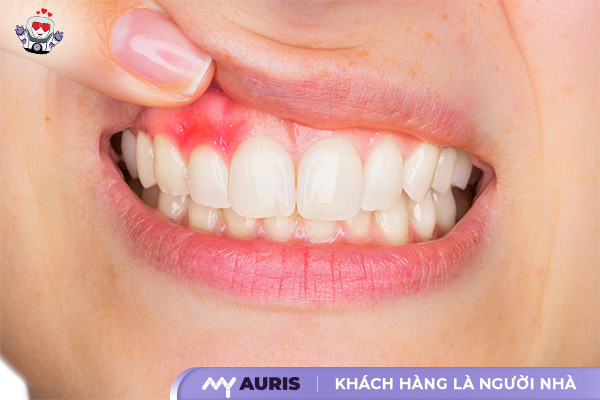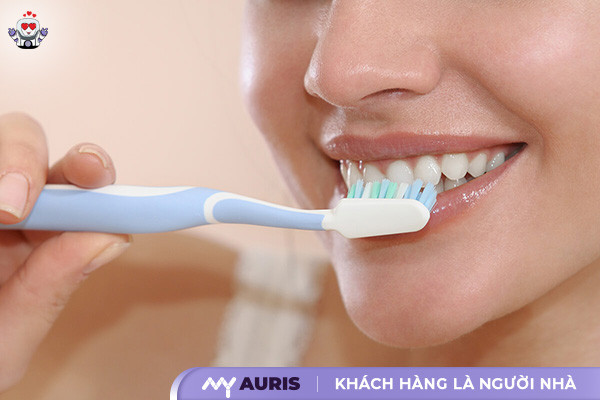Dentists Warn 11 Complications of Poor Quality Porcelain Crowns
Are you looking into porcelain crowns to improve your smile? Cosmetic dentistry brings outstanding aesthetic benefits, restoring damaged teeth and restoring chewing function. The success of porcelain crowns depends greatly on the implementation technique and material quality. However, like any dental treatment, porcelain crowns also carry potential risks of complications. Understanding the problems after porcelain crowns helps you prepare better for the dental restoration and oral care process later. My Auris will provide information about common complications, helping you have better oral health.
Prolonged feeling of pain and sensitivity
After cosmetic porcelain crowns, many people experience pain and sensitivity because they are not used to their new teeth. However, when porcelain crowns are of poor quality, pain and sensitivity can last a long time. The pain often increases when eating or coming into contact with hot, cold, sour, or sweet foods. If this feeling does not subside, you should see a doctor immediately.

Gingival recession
Poor quality porcelain crowns can easily lead to gum recession. Bacteria can enter the gap between the porcelain crown and the original tooth, causing gingivitis and gum recession. This condition not only causes loss of aesthetics but also affects chewing function. It needs to be treated promptly to avoid serious complications.

Pulp inflammation, root tooth damage
One of the dangerous complications is pulpitis or damage to the root tooth due to incorrect technique. When porcelain crowns are not installed properly, bacteria can easily penetrate, causing damage to the original tooth and dental pulp. If not treated promptly, the tooth can be completely damaged.

Broken, chipped porcelain teeth
Poor quality or incorrectly installed porcelain teeth can break or chip when chewing hard foods. This condition not only causes pain but also creates conditions for bacteria to attack the original teeth. Replacement or repair of porcelain teeth is necessary in this case.
Causes bad breath and gingivitis
Ceramic teeth that don’t fit tightly can easily create gaps, causing food to get stuck and difficult to clean. This leads to bacteria growth, causing bad breath and gingivitis Blood is a common sign of this condition.
Bite misalignment
If the ceramic crown is not the right size or does not fit in the correct position, this condition will cause jaw imbalance, causing difficulty chewing and jaw pain. Need to be corrected immediately to avoid long-term effects.
Gingival margins (gums) change color
Gingival margins can become discolored due to irritation with the metal in porcelain teeth or technology If the gum blackening persists, accompanied by swelling, pain or bleeding, you should see a doctor for treatment.

Discoloration Sensitivity and mild pain at the location where the porcelain tooth is attached
The process of grinding teeth to cover the porcelain can expose the dentin, causing sensitivity when eating hot and cold foods. If the sensitivity persists or increases, check with your doctor to determine the cause.
Slight itching in the gums
After porcelain crowns, some people may feel a slight itching in the gums due to invasion of soft tissue. Normally, this feeling will disappear after a week with proper cleaning. If the itching persists, you should consult a doctor doctor.
Eating and chewing makes the teeth feel like they are scratched, cracked, falling out
Ceramic teeth that do not fit perfectly with the original teeth can cause a rough and painful feeling when chewing. In serious cases, the porcelain crown may fall out and need to be adjusted immediately to avoid affecting the original teeth.

Swollen gums red, even pus
Red, swollen gums, dull pain or pus are signs of infection due to unsafe porcelain crowns. If left untreated, this condition can cause receding gums, loose teeth or periodontitis.
Teeth are sensitive
Too much tooth grinding or poorly fitting ceramic crowns can make teeth more sensitive. This symptom usually goes away after 1-2 days, but if it does not decrease, root canal treatment or a suitable ceramic crown should be replaced.
Errors in the crowning process Porcelain
The porcelain crown process requires precise techniques from the dentist. Errors in any step, from grinding teeth, taking tooth impressions to attaching porcelain crowns, can lead to complications. Excessive tooth grinding causes damage to the tooth pulp, gingivitis, and pain gums, bad breath. Improper installation of dental crowns creates gaps, food can easily get trapped, causing tooth decay and gingivitis.
Poor quality dental materials
Poor quality dental materials are a common cause of complications. Poor quality porcelain crowns are fragile, chipped, discolored, causing gingivitis and allergies. Choosing good, biocompatible materials minimizes the risk of complications, ensuring the benefits of porcelain crowns and oral health. Poor quality porcelain crowns lead to complications, which no one wants.
Improper care after porcelain crowns
Poor oral hygiene increases the risk of complications. Oral care after porcelain crowns is as important as taking care of healthy natural teeth remove plaque, bacteria, prevent tooth decay, gingivitis, bad breath. Poor oral hygiene increases the risk of complications, affecting the success of porcelain crowns. Care after porcelain crowns is essential to maintain oral health.
General oral health
General oral health greatly affects the success of porcelain crowns. Patients with dental diseases such as gingivitis, tooth decay, and jaw bone loss are at higher risk of complications. Dental treatment of these problems before porcelain crowns is necessary. No complications is the goal. top priority in dental treatment.
Choosing an unreliable dentist
Choosing a reputable dentist with an experienced dentist, using materials High quality dental materials are the deciding factor in the success of porcelain crowns and the safety of porcelain crowns. Unreputable dentistry, inexperienced doctors, and poor quality materials increase the risk of complications.

How to Overcome Complications of Porcelain Teeth
Have you just had porcelain crowns and are having problems? Don’t worry! This article shows you how to handle common complications, helping you regain your confident smile and oral health I focus on practical, easy-to-understand solutions that help you proactively take care of your oral health.
Immediate Handling When You Encounter Complications
Timely handling of complications after porcelain crowns is very important to protect oral health and the success of porcelain crowns. Below are detailed instructions:
- Pain: If the pain is mild, you can take painkillers as directed prescribed by your dentist. Avoid using cold compresses on the outside of your cheek to help relieve pain. If the pain is severe or persistent, contact your dentist immediately.
- Gingivitis, swollen gums: Rinse your mouth with diluted warm salt water several times a day If it doesn’t improve, go to the dentist for treatment.
- Bad breath: Clean your teeth thoroughly, use dental floss to clean between your teeth. If bad breath persists, see a dentist to rule out other causes.
- Loose, broken, chipped porcelain crown: Avoid chewing hard or biting on hard objects in the affected porcelain tooth area. Contact the dentist immediately.a to be examined and processed.
- Material allergy: Stop using any product suspected of causing an allergic reaction. Notify your dentist immediately for advice and treatment.
Seek Dental Support
Most complications require intervention by a dentist. faculty. Don’t hesitate, contact your dentist immediately if you encounter any problems after getting porcelain crowns.
- Exactly describe the problem: Jot down the symptoms you have, when they started, their severity, and any factors you think might be involved. This helps the dentist make a more accurate diagnosis.
- Follow your doctor’s instructions: Your dentist will provide a treatment regimen suitable for your condition. Complying with your doctor’s instructions is an important factor in the success of treatment.
- Choose a reputable dentist: A reputable dentist with a team of experienced doctors and modern equipment will ensure safety and effective treatment.
Proper oral care and choosing a reputable dentist is the key to good health. Oral health, facial aesthetics, and success of porcelain crowns. Prevent complications by practicing good oral hygiene, following a regular check-up schedule, and choosing quality dental materials. Porcelain crowns bring many benefits, but need to be done with the right technique and care to avoid risks and side effects. Don’t let complications affect your oral health and smile. Be proactive in taking care of and protecting your teeth.

Oral Care After Porcelain Crowns to Avoid Complications
Step 1: Choose appropriate cleaning tools
Invest a soft-bristled toothbrush, cream Brush your teeth with fluoride and floss. Your dentist will advise you on the type of dental floss suitable for your tooth restoration. Good dental materials combined with proper hygiene help minimize complications.
Step 2: Brush your teeth properly
Brush your teeth at least twice a day, 2 times a day minutes. Set brush nTilt 45 degrees to the gums and brush gently in a circular motion. Avoid vigorous rubbing that causes gum damage, gingivitis and affects dental crowns and bridges.
Step 3: Use dental floss daily
Use dental floss to clean between teeth, remove plaque, leftover food, and prevent tooth decay and pulpitis. Complications can cause pain and discomfort, so pay attention to oral hygiene.
Step 4: Rinse your mouth with mouthwash
Rinse mouth Using mouthwash containing fluoride helps protect teeth, gums and jawbone, preventing bad breath. This contributes to maintaining overall oral health.
Step 5: Regular dental check-ups
Regular dental check-ups every 6 months to see a dentist The department examines and cleans teeth, detects dental problems early, provides timely dental treatment, and prevents complications. Poor quality porcelain crowns lead to complications. A reputable cosmetic dentist will advise on the process of porcelain crowns, types of porcelain crowns and clear costs of porcelain crowns.

Choosing a Reputable Dentistry for Porcelain Crowns to Minimize Complications
Choosing the right dentist is the first step to avoid side effects of porcelain crowns and Problems after porcelain crowns. Here are the steps:
- Get informed: Start with thorough research. Explore information about dental clinics online, read patient reviews, and review dentists’ certifications and qualifications. Focusing on dentistry specializing in dental restorations, dental implants, porcelain veneers and other dental treatment services.
- Consult: Talk to relatives and friends who have experienced porcelain crown services. Their practical experience will provide a realistic view of the quality of service, the porcelain crown process, the types of porcelain crowns and the cost of porcelain crowns at different dentists.
- Visit in person: Observe the clinic’s facilities and equipment. Modern dentistry, fully equipped with advanced machines and high quality dental materials will ensure the processSafe and effective treatment, minimizing discomfort after porcelain crowns. Evaluate hygiene and professionalism in the dental care process at the dentist.
- Consult with a doctor: A good dentist will listen to your needs, thoroughly examine the condition of your teeth, jawbone, and gums, advise you on choosing the appropriate treatment method, and clearly explain the porcelain crown process, the benefits of porcelain crowns as well as the risks of porcelain crowns and potential consequences of porcelain crowns. Ask questions about the doctor’s expertise and experience, complications, gingivitis, tooth decay, root canal problems, crowns, bridges, and how to care after porcelain crowns and proper oral hygiene.
Compare costs: The cost of porcelain crowns is an important factor. However, don’t be cheap and choose poor quality dentistry. Compare costs between reputable dentists, considering service quality, dental materials and price. Note, poor quality porcelain crowns lead to complications that can be more costly in the long run.





